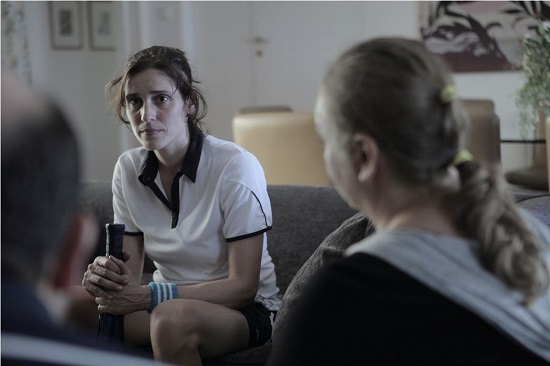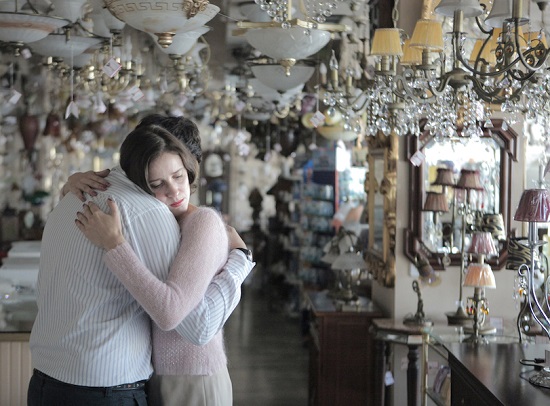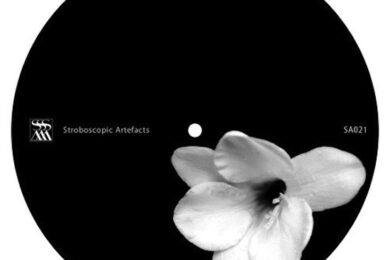In Dogtooth, Greek director Yorgos Lanthimos pushed black comedy towards horror in depicting the bizarre brainwashing rituals of a family deliberately cut off from the outside world. Redefining words as they see fit, the parents force their children to be terrified of what lies beyond the family’s walled garden. At the start, it’s easy to suppose that Dogtooth is set on some Martian outpost where human culture has been misremembered. But once it becomes clear that the setting is definitely closer to home, the discomfort Lanthimos’s film causes can be put down to the notion that this outrageous family is just normality taken to an absurdist extreme.
Dogtooth won the Un Certain Regard prize for young talent at Cannes 2009 and went on to be nominated for the Best Foreign Language Academy Award. Subsequently, Lanthimos acted in Attenberg, another Greek drama of disaffection, and also moved to Hackney. His followup feature, Alps, which won Best Screenplay at Venice 2011 but received a more muted critical reception than Dogtooth, continues to probe the dark side of intimacy. Released on DVD in the UK on 11 March by Artificial Eye, Alps can be seen as Dogtooth turned inside-out.
Alps is the name given to an oddball group, whose members have mountain nicknames, that approaches recently bereaved people with the offer of role-playing services. For a fee, one of the Alps will pretend to be the dead loved one in a strange private theatre that the survivors script. The ensuing memorial scenes aren’t, however, obviously sentimental or uplifting. An old lady wants to reenact the moment she discovered her late husband’s affair; the owner of a lighting shop replays arguments; parents ask that their deceased daughter’s teenage dating be staged in her bedroom. It’s a creepy kind of therapy which suggests that hurt always imprints itself more deeply than happiness, though the line between pain and pleasure is increasingly hard to draw. The element of masochistic ambiguity in Alps gives it an extra layer of nuance compared to Dogtooth, and takes us even more deeply into the weirdness of the normal.
The leader of the Alps group is a disciplinarian who doesn’t get emotionally involved in the work. But this isn’t true of one of the role-players, a nurse played by Aggeliki Papoulia (who was also the rebellious older daughter in Dogtooth). She starts to break the group’s rules as she’s sucked more and more into the emotional dramas in which she guest-stars. Whereas Dogtooth ends with escape from imprisoning domesticity, Alps wonders about the insidious appeal of family no matter how troubled and perverse.
Both Alps and Dogtooth present weird situations without much initial explanation. What’s your approach to storytelling?
Yorgos Lanthimos: To me it’s more interesting if a story is built up gradually. I like to see scenes that intrigue me, that start me thinking. Who are these people? Why are they doing these things? I think it’s also closer to real life. You meet someone but you don’t really know much about him. You see him doing something and you try to figure things out.
My collaborators and I start from certain conditions and ideas rather than a storyline. In Dogtooth we were interested in how much you can distort human perception about the world. That was the idea and you find a way to place it somewhere, then find the scenes that can serve the idea, then build the narrative. With Alps, it started with thinking about death and how people deal with it. After we started discussing it then building scenes, we realized that we were much more interested in these people who offer the role-playing service than the bereaved themselves. That’s why the main character ends up being the nurse. We see what role-playing does to her and others when it gets out of control. Alps became in the end a film about the roles we all play in our everyday lives.
Is your take on the disturbing, often cruel games people play satire or social critique?
YL: We don’t start with any intention to make a radical commentary on human behaviour or the human condition. But we’re intrigued by human behaviour. By getting people together to make a film, we create a kind of lab where we can experiment and see what happens. That’s why I think and hope the films end up being quite open in a way – and I think this is mostly how art works and how it intervenes in and interacts with reality. We conduct the experiment and let people come to their own conclusions. If someone happens to perceive Alps as a radical critique, that’s great. But someone else might see it as just entertainment; as an experience that therapeutically allows certain issues to be dealt with; or as an awakening – because it deals with things that a viewer hasn’t really thought about before.
How much improvisation do you allow?
YL: We always have a complete script, but it never describes the characters, and we don’t go into rehearsal with any preconceived notion of how they should behave. The script does dictate tone, but the actors (some of whom are nonprofessionals) are free to explore the characters, and this process changes what I had originally envisaged. The other thing is that during the shoot for Alps, if we finished a day’s two scenes early enough, then we would spend the remaining time coming up with new scenes with the day’s characters and locations. As soon as everyone has a code and a feel for the film’s atmosphere and tone, the actors don’t really do things that are much outside of that, so some of these improvised scenes work very well. Some of course don’t. Or they might be great on their own but they don’t necessarily fit the structure of the film. But even just as an exercise for the actors to develop this code, to feel much more comfortable in their characters, it’s also useful – like rehearsals are sometimes.
How would you describe the Alps role-players’ group dynamic?
YL: It’s just a group of people, not so different from groups anywhere. In this case, it’s like a business scheme. Some of them might have in mind that they’re also doing some good for the families they work for, though motivation isn’t really investigated in the film. The dynamic isn’t much different from what might be found in families, business, sports, whatever. There’s a leader; there are rules; there are people who have to follow them and people that want at some point go down a different route. Then there’s the nurse’s rebellion and the punishment that follows. This group reflects many different social models: you could even say it’s a cliché of group behaviour. The role-playing is something unusual and unfamiliar in some ways, but the dynamic is easily recognisable.

The role-playing idea has sometimes cropped up in science fiction – for example in the Joss Whedon TV show Dollhouse. Are you interested in science fiction?
YL: I’m definitely interested in science fiction, but it wasn’t a specific reference point for either film. Dogtooth could be a science-fiction film in which you don’t know what the state of the rest of the world really is. There could have been a version of the film where you go out and show how the rest of the world is. More important, though, was a slightly different idea: what if there were no normal families in the world? Society’s no longer working and so two parents try to keep their family totally separate and secretly raise their children according to their own rules. But I realized that if we went too far outside this secluded world to explore the problems outside, it would all get much too complicated.
There’s a new script I’m working on with Efthymis Filippou, my co-writer also for Dogtooth and Alps, which has more of an explicit fantasy element. In general in our writing, we identify certain things in society and we want to push them into extreme fictional situations. If you push like this, it starts to seem like science fiction. But Dogtooth started with the common everyday fact of how Greek families are, especially the attachments between parents and children. The strangeness of something that’s rooted in what’s familiar also involves an element of absurdism and black comedy too, of course.
Things take all kinds of unexpected, painful, masochistic turns during the role-playing in Alps. It gets quite dark.
YL: I just think such feelings and reactions are in our nature and we have to include them. I don’t think you can ever set up this happy little world around you. It’s not just happiness. Maybe we basically feel much more alive when we’re also in pain. I think it would be a very one-dimensional thing if the bereaved people only needed to recreate their happy moments. Some would opt for this possibly, but to me it seems that this whole thing would become more real to them if they also re-experienced conflict or sad moments. The role-playing involves every aspect of the memory of the loved one. To me it’s just more real like that. It’s like the way actors enjoy to be engaged with dangerous things, they like to get hurt. It’s like somehow for different reasons we need to go through these things as well. The role-playing is already fake anyway: there’s this person that you don’t really know and pretends to be someone you love.
This is connected to the mood of Greek funerals. There’s no celebration when someone dies. In other cultures there is: people play songs, maybe they have a party and drink somewhere and celebrate the dead. In Greece it’s much darker. There’s no singing. They just go to the church, bury the dead person. Then they drink coffee and eat a particular wheat cake with raisins and it’s all about the pain of mourning. You could think that somehow it’s easier logically to accept death if you also include the bad things about it – it could be easier to let go. Take the lighting shop owner in Alps who wants to relive arguments with his lover. His life with her was just a nightmare, but at the same time he loved her. If he concentrates in the role-playing on all the bad things, maybe that’s the way to let go. That choice would make sense in order to move on.
We’re trying to include everything we can imagine that this situation would bring out in people. We’re experimenting, exploring. I would never want to say outright that families have a masochistic relationship and structure. Basically I think it’s true in many cases, but not in all. You can’t generalise. But it’s there: I do believe that pain in families somehow becomes a way of living, the essence how people manipulate each other. That’s very evident, at least according to my own experience.
In the old Greek comedy films there was always this blackmail by mothers who would faint whenever a son did something they didn’t want. In Greek families there’s blackmail, infliction of suffering, including physical punishment of a kind that wouldn’t be acceptable in some cultures. But then again I heard that in Sweden if a parent hits his child he can end up in prison. That’s kind of absurd in a different way.
The nurse wants to break into family life in Alps, as opposed to breaking out in Dogtooth. What’s the attraction for her?

YL: Her life is empty. She doesn’t feel comfortable in her life. Compared to that, even an abusive lover or family could be better. We did shoot a scene which we didn’t use in the end where she also tried to break into the house of the lighting shop owner. It’s not specifically the family home that appeals to her. What matters is that she’s trying to belong in a different life, whatever that may be, to find something to make her own, to be part of a certain kind of relationship. The Alps group doesn’t satisfy her fundamentally, though it’s through Alps that she perceives opportunities to belong. It’s like saying if you go and play golf you’re fulfilled, but in truth everyone needs something much more substantial. Maybe by doing something else you’re able to meet people, but it’s not the thing itself that fulfils you.
But surely there’s not much difference in the end between the Alps group and the people she thinks might offer her some deeper fulfilment?
YL: Possibly, but I hadn’t thought of that! There’s no right or wrong. In everyday life, when we’re on the outside and see someone doing something completely absurd, we’re surprised and confused. But it’s not for us to judge. We can’t do much more than observe what people do. It seems that the nurse may never find contentment, but ultimately you can’t apply your own logic to everyone else’s actions – or you could, but you’d end up in a dead end.
Alps is available on DVD now from Artificial Eye



